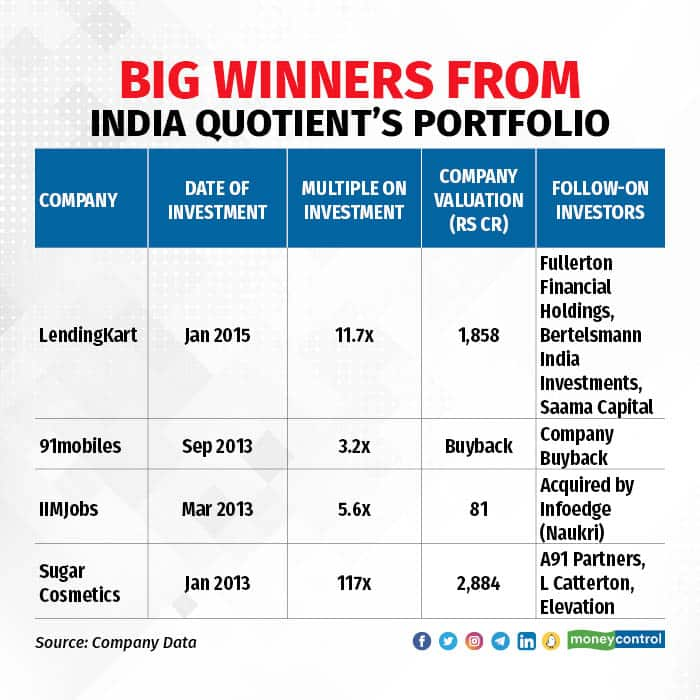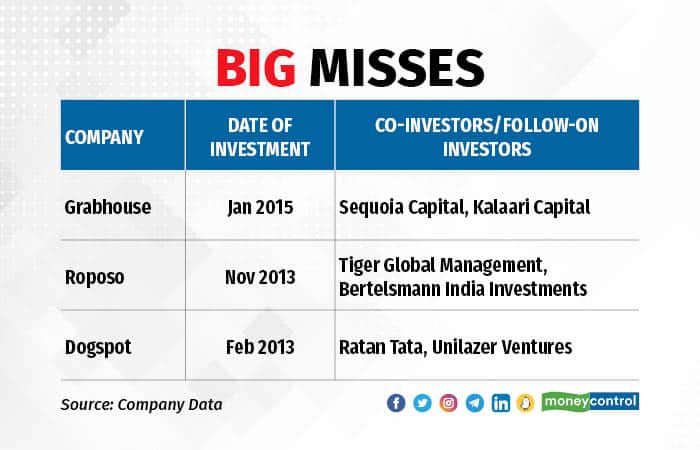



India Quotient, one of India's most prominent homegrown early-stage investors, has returned its first fund, which was launched in 2013 with a net return of 5.9x. India Quotient has backed 87 startups, including Sugar Cosmetics and Sharechat. But the company's founding partner, Anand Lunia, is unimpressed. He believes that the venture capital (VC) firm could have performed considerably better.

With the first fund, India Quotient invested in 21 companies, four of which, according to Lunia, were "clear winners." According to Lunia, the four portfolio winners—IIMJobs, Sugar Cosmetics, LendingKart, and 91mobiles—provided returns ranging between 3.2x and 117x.

The first fund, which had a corpus of Rs 32 crore, delivered gross returns of 7.1x and counts Times Internet, Ronnie Screwvala, Paytm's Vijay Shekhar Sharma, MakeMyTrip's Deep Kalra, Ravi Adusumalli, Ashik Mittal, Ashish Goenka, SIDBI, and Omidyar Network India among its limited partners (LPs).

Since then, India Quotient has raised four more funds, the fourth of which has a corpus of Rs 850 crore and an opportunities fund with a corpus of Rs 271 crore. With the subsequent funds, the VC also backed companies such as Giva, Vyapaar, Local, and Masai School, among others. In a 40-minute no-holds-barred interview with Moneycontrol, Lunia discussed his first fund's learnings, the themes on which he is bullish, and how India's edtech sector needs a "complete reset." Edited excerpts:
You have delivered 5.9x returns to your LPs. Can you share some of your learnings from fund 1?I will give you an example. We invested in a company called Belita. It was one of the first beauty services companies, like what Urban Clap (Urban Company) does now. It was a very good company, but we ourselves had such little money that we put in a small cheque and couldn’t support this company. Then Urban Clap arrived, disrupting the market with discounts, etc., and Belita was forced to shut down.
So this is a lesson we learned. You need a slightly larger fund size, and we needed to push companies to raise capital early. I was an old-school VC, always advising companies to raise smaller amounts, break even as soon as possible, and believe that a startup should be bootstrapped, among other things.
However, in a competitive market, this does not work. So, about midway through fund 1, we began to push our companies to raise money; we would also go in and pitch to other people, and it worked very well for us.
And, if I must speak of the future, we are planning to raise a larger fund sometime next year, though it is too early to comment on the size. Last year, everyone overinvested, and we were quiet, so we still have money that isn't deployed.
How do you look at the funding frenzy of last year? You said you were quiet last year when everyone was ‘overinvesting.’ Is it because the valuations were inflated?Yes, I believe that was the case. Moreover, while valuations were inflated later on, I believe investors didn't mind because these companies were already established.
With all due respect, most companies that start during bubble times are gold diggers. These are the people who want to look for gold. People who begin in a difficult period, such as today, when everyone is talking about funding winter, valuations falling, and so on, are courageous. Last year, we only got mercenaries. So, for us, what matters most is the quality of the founders. That's why we were slow last year, and high prices (valuations) were also a problem.
You said you advised companies to raise more money to stir through a ‘competitive market.’ But there is also criticism of companies raising money aggressively and then blowing it up very fast, which leaves them with little runway during a slowdown. So, what would you advise portfolio companies?If you have read my articles, you will know that I am against companies raising too much capital. However, India is a large country. We have a lot of entrepreneurs and a lot of capital chasing the country. This means that companies must raise enough capital to stay competitive, but they should not be completely dependent on external capital.
This is the balance that founders struggle to get. A lot of founders we talk to raise capital only to make sure they do not lose out to the competition. Even VCs push founders to raise capital for the same reason and we have suffered a lot because of the competitive nature of the Indian venture capital and startup world. We are still very conservative.
We tell them (founders) that they need capital to win, but they also need to start a business as soon as possible. You can play the startup-startup game for three to four years, but you must start doing business as soon as possible, and that has been our philosophy.
Swiggy and Zomato are only competing against each other, so deep discounting is not required, but it is ingrained that in order to grow, you must offer discounts. Zomato only stopped these discounts after public (market) pressure, and I am happy they did so. However, it should have happened much sooner.
How different do you feel is the current slowdown compared to the previous slowdown?This is a weird downturn in which a lot of money was sitting on company accounts. When companies have a lot of money, the pain is very slow. In a downturn like this, corrections are usually swift. Companies run out of money after six or twelve months and shut down. Here, the company will linger for two to three years, so the pain will be very slow.
Take Unacademy as an example; they laid off 10% of their staff twice. They should have done a 50% reduction in headcount all at once and then said, "Now we will grow headcount." However, all of these companies are making small, incremental cuts every six months, implying that the pain will last much longer
During the previous downturn, many companies, including unicorns like Shopclues, were forced to shut down due to a lack of funding; this time, it will be a slow death.
So there will be a lot of zombie unicorns this time. I also believe that the current trend toward profitability will not last long. VCs will soon forget about profitability. It is not a permanent shift; rather, VCs and bold VCs should advise startups to be more aggressive in this downturn in order to gain market share.
What are the themes to watch out for?The last decade was largely about bringing globally successful companies to India, such as Flipkart in India and Amazon in the United States, Ola in India and Uber in the United States, Swiggy-Doordash, and Grofers-Instacart.
This decade will be defined by companies that are unique to India. Looking at recent successes, Byju's is a very unique company in the world, because McGraw Hill sells to schools but not to parents. Paytm, on the other hand, is a unique company. Paytm is now doing very well, especially after their IPO (initial public offering), and their results are coming along nicely.
While Zomato and others have global parallels, UPI is unique to India. Similarly, we have a lot of things that are unique to India in niche sectors such as healthcare, education, finance, and microfinance. Because these things have no global parallels, this decade should be about these companies.
Another sector that, in my opinion, will do well in the coming decade is SaaS (software-as-a-service) serving Indian companies. There are currently SaaS companies that only serve global markets. However, software for India is lagging and no one is developing software for India. Businesses in India should adopt software over the next decade, so B2B (business-to-business) SaaS for India should be a sector to watch.
Two of the sectors you mentioned as being unique to India, fintech and edtech, are currently experiencing difficulties due to a funding winter. The RBI regulations and the reopening of schools, colleges, etc. have dampened the growth prospects of fintech and edtech companies, respectively.
You have invested in both sectors. What is your outlook?Fintech, in my opinion, is a sadabahaar (evergreen) sector. Fintech penetration in the country is so low that I think the sector will continue to grow. We remain extremely bullish on the sector.
I believe that education and edtech require a much better quality of entrepreneurs who should not be exploiting parents' fears and forcing them to pay large sums of money, but rather thinking of them as consumers and delivering value. I haven't seen that in edtech, whether it's sales tactics, pricing, or course packaging for four years or so where you can't back out and end up wasting your loans. That is not education. Education, more than any other business, must be mission-driven. These companies are not mission-driven. Edtech needs a complete reset.
I am happy with fintech. The BNPL (buy now, pay later) thing is perhaps not doing so well, but the sector is otherwise very good and I expect it to do well.
Data suggests early-stage investments are growing this year while late-stage investments are dropping. What is your outlook?Right now, all the guys who were writing cheques last year are saying, we have money, we have teams, so let's make smaller investments. Now, everyone is only focused on the Seed stage. Even big funds are focusing on Seed stages, which creates a large volume there.
The internal difference is that we haven't seen any B2C, or consumer, startups this year. We have struggled to see even 10 good consumer startups funded this year, but the theme for this year is SaaS. So there is a shift, and I believe it will continue for some time because founders who want to start consumer companies will have to rethink their strategies for now.
Lastly, how long do you expect this funding winter to last?It is not a funding winter, in my opinion. There was a funding winter in 2009. Even profitable companies had to settle for down rounds back then. In India, I recall only single-digit VC rounds in 2009. In comparison, rounds are still taking place this year.
So, in my opinion, there is no funding winter; rather, money is becoming more selective. I believe funding would be lower because VCs would prefer to bet on safer sectors such as SaaS, just as public markets bet on FMCG (fast-moving consumer goods) or pharma (in tough times).

Discover the latest Business News, Sensex, and Nifty updates. Obtain Personal Finance insights, tax queries, and expert opinions on Moneycontrol or download the Moneycontrol App to stay updated!
Find the best of Al News in one place, specially curated for you every weekend.
Stay on top of the latest tech trends and biggest startup news.